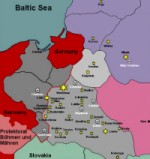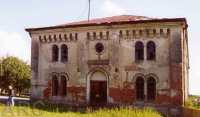 |
 |
 |
 |
 |
 |
 |
| Ghettos |
On the outbreak of WW2 an influx of Jews arrived from Western Poland, increasing the number of Jewish inhabitants to about 700. German troops arrived in the town on 12 September 1939, and remained for two weeks, until under the terms of the agreement between Germany and the Soviet Union, the Germans relinquished the town to the Soviets. On 1 November 1939, Wielkie Oczy and the surrounding area occupied by the Soviets were incorporated into the Ukrainian Soviet Republic, where they remained until the outbreak of hostilities between Germany and the Soviet Union on 22 June 1941.
German troops re-occupied the town on that very day. In July or August 1941, a Judenrat was established, with Wolf Thaler as its head. At the end of 1941, an unknown number of young Jews from Wielkie Oczy (along with Jews from Jaworow, Krakowiec and smaller villages, about 200 people in total) was taken for forced labour to Winniki near Lwow and Jaktorow near Zloczow. They were building an arterial road Durchgangsstraße IV. None of them survived. An unknown number of Jews (less than 100) was resettled at the same time to Jaworow.
 |
| Wielkie Oczy Synagogue |
"Particular cruelty was exhibited by the chief of the German police from Jaworow, a man named Wolf. His favourite occupation was scaring Jews with his German shepherd dog with which he never parted. Particular persecutions were meted out to those fathers of families whose sons or daughters were able to flee east to Russia before the Germans entered. Victims were tied to a post in the town square and beaten without mercy. The executioners were the Ukrainians from the local police precinct. At the head of the Ukrainian Gmina were Smutek as the wojt (leader) and Bulycz as the secretary. Every several weeks Wolf arrived in the village along with his German administrators to collect "contributions" in the form of jewellery, furs, etc. from the Jewish Gmina. In the fall of 1941 the young and strong men, per the list provided by the Judenrat, were taken away to an unknown destination, probably to the Janowska Road Camp in Lwow. In this camp my father Abraham Majus died in 1943."
On 1 June 1942, a new Judenrat was appointed with Dawid Kolberg as itís chief and Abraham Falik as his deputy. An Ordnungsdienst was also established, headed by Mendel Ornstein. This was most probably part of the preparations for the Aktion.
On 10 June 1942, the entire Jewish population was summoned to the town square. Those who could walk were marched to the ghettos in Krakowiec, 7 km from Wielkie Oczy and to Jaworow. The old and sick were transported on wagons. The action was supervised by Landkommissar Josef Steyert from Grodek Jagiellonski. The Landkommissar reported to the authorities in Lwow that 168 persons had been sent to Krakowiec and 274 to Jaworow. About 100 Jews had escaped to the nearby forest. Many were subsequently recaptured and sent to join their families. In the winter of 1942, most of the Jews of Krakowiec and Jaworow were transported to Belzec.
Those Jews who survived these deportations fell victim to the final liquidation of the Jaworow Ghetto in April 1943. Some were sent to the Janowska Road camp. A few of those who had escaped to the forest survived until the liberation of Wielkie Oczy by the Red Army in July 1944.
Sources:
www.shtetlinks.jewishgen.org/WielkieOczy/
© ARC 2005